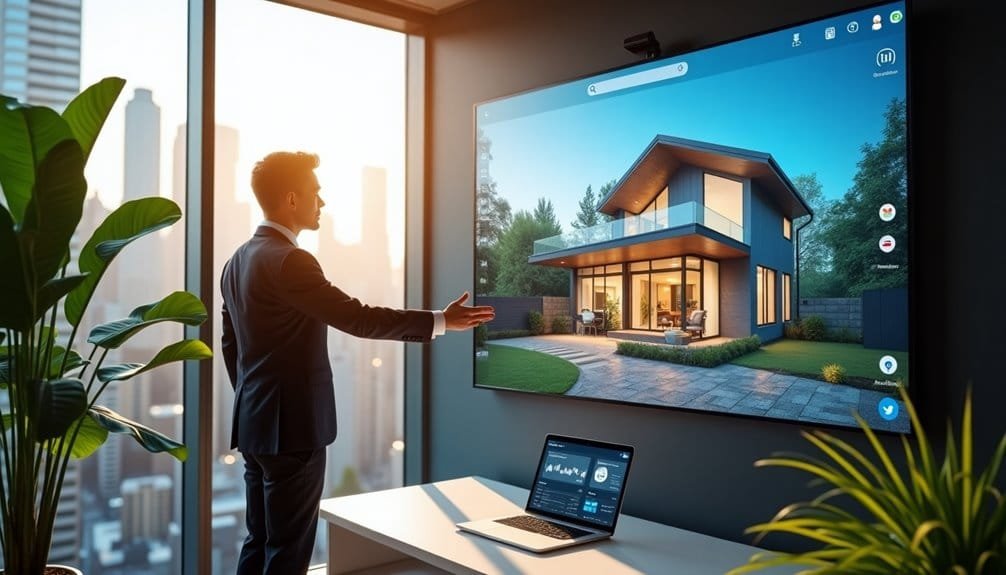Social media transforms your real estate business, providing tools to boost lead generation, brand credibility, and client relationships. On Instagram, leverage high-quality images, videos, and interactive content like polls to engage potential buyers effectively. Facebook allows you to run targeted ad campaigns using demographics to reach your ideal audience, enhancing trust through authentic engagement and client testimonials. LinkedIn focuses on professional networking by connecting with colleagues and industry influencers, expanding your reach. Maintain brand consistency across platforms by uniform visual identity and messaging, while actively participating in community discussions. Explore how these strategies can enhance your real estate success next.
Key Takeaways
- Utilize Instagram for high-quality visuals and interactive content like polls to engage and captivate potential buyers.
- Leverage Facebook’s advanced targeting options for cost-effective advertising and brand recognition among ideal audiences.
- Maintain a consistent brand presence across platforms with uniform visual identity and messaging.
- Engage with professional connections on LinkedIn to expand your network and enhance credibility.
- Share local news and insights to position yourself as a community expert and foster audience trust.
Importance of Social Media

Social media’s become an indispensable tool for real estate professionals, revolutionizing how they connect with clients and market properties. With 87% of real estate agents using Facebook for leads, it’s clear that social platforms are essential for expanding your client base. Promoting listings online, which 90% of agents do, allows for targeted advertising based on demographics, interests, and behaviors, helping you reach the right audience. Leveraging ready-to-use templates can further enhance your marketing strategy by increasing visibility and engagement on social media.
Building and nurturing relationships with potential clients is easier through social media. You can engage in real-time interactions, strengthening connections and establishing credibility. Visual storytelling, a powerful tool in real estate, is enhanced through social media, allowing you to showcase properties effectively. High-quality photos and videos capture attention and tell stories that resonate with viewers. Furthermore, given that 52% of leads from social media are considered higher quality than those from MLS, focusing your efforts here can significantly enhance your lead generation strategy.
Furthermore, social media provides a cost-effective way to market your services. It extends your reach beyond immediate networks, especially important as house hunting shifts online. With millennials and Gen Z increasingly comfortable buying homes sight unseen, leveraging social media’s full potential can drive organic traffic and bolster advertising campaigns. By consistently engaging clients and sharing success stories, you build trust and foster long-term relationships.
Leveraging Instagram Effectively
When it comes to leveraging Instagram effectively in real estate, focusing on a strong visual content strategy is essential. You should use Instagram’s visual format to showcase stunning property photos and videos. High-quality images and carousels are a must for your listings, as they captivate potential buyers. Video content, such as walkthroughs and drone footage, greatly boosts engagement, allowing viewers to experience the property remotely. Additionally, include market insights and statistics in a visually appealing manner to enhance your credibility and position yourself as an expert. Consistent use of a cohesive aesthetic aligned with your brand can further strengthen your visual impact and memorability.
To build engagement and foster community, employ these strategies:
- Engagement Techniques: Regularly feature your team and client success stories. Use Instagram Stories and Reels for interactive content.
- Hashtag Strategy: Leverage hashtags to expand your reach and connect with a wider audience interested in real estate. Hashtags like #realestate and #homesforsale attract millions of posts, making them effective tools to connect with potential buyers and sellers.
- Local Involvement: Engage with local businesses and participate in community events to create a sense of connection and authenticity.
Promote your listings actively on Instagram, highlighting both active and sold properties to showcase your success. Share client testimonials to build trust and emphasize unique property features to attract interest. By optimizing Instagram for lead generation, you can effectively reach potential buyers and showcase your real estate expertise.
Maximizing Facebook Potential

Instagram’s vibrant visual platform may have already boosted your real estate visibility, but Facebook offers a distinct opportunity to expand your reach even further. Start by creating effective ad campaigns. Identify your target audience by filtering geographic location, marital status, and interests. Remember to use Facebook’s Special Ad Category to comply with regulations, ensuring your ads are properly targeted. Localize your ads to connect with buyers and sellers in your area, using compelling photos, videos, and virtual tours to showcase properties. Direct potential clients to landing pages designed for straightforward conversions.
Building a strong brand presence on Facebook is essential. Maintain consistency in your brand voice across all platforms to cultivate your niche and retain interest. Engage actively with your audience by responding to comments and encouraging interaction, which strengthens brand loyalty. High-quality visual content, such as photos and videos, will drive engagement and potentially increase sales. Since relationship-building fosters trust, it’s crucial to engage with your audience authentically, creating lasting client-agent partnerships.
Take advantage of Facebook’s advanced targeting options. Use demographic, geographic, and interest-based targeting to hone your audience. Implement retargeting ads to remind potential clients of properties they previously viewed, keeping them engaged with your offerings. Regularly reassessing audience demographics and preferences can help marketers optimize their campaigns for better engagement.
Utilizing LinkedIn for Networking
Immerse yourself in the world of LinkedIn to elevate your networking game in real estate. It’s not just about connecting; it’s about forming meaningful relationships that can boost your career. Focus on professional connections by engaging colleagues, past clients, and industry influencers. Diversifying your network is key, so reach out to professionals in complementary fields like mortgage lenders and financial planners who can offer different perspectives. Connecting with local business owners, leaders, and media personalities can also help boost your profile. LinkedIn has over 830 million global members, providing access to a vast client pool and serving as a professional networking platform for real estate agents. The platform’s business-focused content leads to less competition and higher visibility, making it an ideal space for networking effectively.
To optimize your LinkedIn presence, confirm your profile is complete and current, with a professional headshot and clear background image. Personalize connection requests to show genuine interest, and leverage direct messaging for sharing valuable insights or exploring collaboration opportunities.
Here are three strategies to maximize your LinkedIn networking:
- Join LinkedIn Groups: Participate actively in discussions and share your expertise to build credibility.
- Use LinkedIn Tools: Utilize InMail and Sales Navigator to reach beyond your immediate network.
- Engage Regularly: Like, comment, and share content to stay visible and connected with your network.
Creating Engaging Content

Although social media platforms abound, creating engaging content in real estate requires a strategic approach to stand out. High-quality images and videos are essential; they capture attention and maintain a professional appearance. Consider using virtual tours to offer an immersive experience, allowing potential buyers to explore properties from the comfort of their homes. Infographics are another powerful tool, providing concise, visually appealing information that can easily convey market trends or home staging tips. Sharing behind-the-scenes content can further enhance engagement, offering a more authentic glimpse into your day-to-day activities and building a connection with your audience. Consistent posting not only maintains visibility but also builds a loyal following, as regular engagement helps keep your brand top-of-mind for potential clients.
To build audience engagement, engage regularly through comments and likes. Hosting Q&A sessions or live virtual tours not only showcases your expertise but also invites interaction. Polls and quizzes on Instagram Stories are effective for gathering feedback and keeping your audience engaged. Don’t overlook the power of sharing local news and events; by keeping your followers informed, you position yourself as a community expert. Featuring client testimonials can reinforce your credibility and trustworthiness. Employing these strategies, combined with diverse content like neighborhood guides and educational posts, guarantees a balanced and engaging social media presence. High engagement potential with quizzes presents opportunities to grow your contact database via email exchange and insights into audience preferences.
Boosting Visibility With Ads
After crafting engaging content, it’s time to amplify your reach with strategic advertising. Social media platforms like Instagram, Facebook, and LinkedIn offer sophisticated tools to precisely target specific demographics, interests, and behaviors. This increases the likelihood of connecting with quality leads. By investing in paid campaigns, you greatly boost your visibility, guaranteeing your marketing messages reach the right people at the right time.
Here’s how to effectively boost your visibility:
- Precise Targeting: Use the advanced targeting features to focus on your ideal audience. Select criteria such as age, location, and interests to guarantee your ads are seen by those most likely to engage.
- Cost-Effectiveness: Compared to traditional advertising, social media ads provide a higher return on investment. They’re a budget-friendly way to reach a large audience without breaking the bank.
- Engagement Metrics: Monitor click-through rates, conversion rates, and other engagement metrics to assess your campaign’s performance. This data-driven approach allows for continuous optimization, enhancing the effectiveness of your advertising efforts.
Incorporating these strategies, you can enhance lead generation, streamline the process for potential buyers, and ultimately foster long-term brand recognition and trust in the real estate market.
Building Brand Consistency

How can you guarantee your real estate brand stands out in a competitive market? Building brand consistency is key. Start by creating a uniform visual brand identity across all platforms. Use the same logos, colors, fonts, and imagery to make sure your brand is easily recognizable and trusted. This cohesive look not only simplifies your marketing efforts but also presents a professional image that sets you apart from competitors. Draft detailed brand guidelines to help maintain consistency in your visual elements, making it easier to create efficient marketing materials.
Equally important is your brand tone and messaging. A consistent tone reflects your business’s values and personality, helping build trust and credibility. Audiences are more likely to connect emotionally when your messaging is clear and consistent. In contrast, inconsistent messages can confuse and deter potential clients, disrupting the seamless customer experience you aim to provide.
Cross-platform consistency is crucial too. Tailor your approach for each social media platform while maintaining your brand’s core identity. This repetition strengthens your brand’s presence, presenting a professional and reliable image. Regular audits of your social media profiles can identify and correct inconsistencies, making sure your brand remains relevant and cohesive.
- Prepare for Loan Maturities and Refinancing Waves as a Real Estate AgentIn mastering loan maturities and refinancing waves, uncover strategies every real estate agent needs to empower clients during pivotal financial transitions.
Enhancing Audience Engagement
Engaging your audience is essential for standing out in the competitive real estate market. By employing interactive content, you can foster meaningful connections with potential clients. Leverage Instagram Stories’ interactive stickers—like polls, sliders, and quizzes—to prompt engagement and gather insights on follower preferences. Hosting live Q&A sessions on Facebook and Instagram allows you to address common questions in real-time, building rapport and trust. Sharing behind-the-scenes content, like unscripted moments of property preparations, makes your brand more relatable and authentic.
To enhance audience engagement, consider these strategies:
- Visual and Informative Content: Utilize high-quality visuals and virtual tours to captivate interest. Sharing market insights and neighborhood highlights establishes you as an expert while providing valuable information.
- Audience Interaction: Encourage interaction by responding promptly to comments and messages. Clear calls-to-action, like asking followers to tag friends, help expand your reach organically.
- Content Strategy: Diversify your content across platforms. Balance promotional posts with educational content, such as local grants and initiatives, to offer genuine value and spark engagement.
Frequently Asked Questions
Recent Posts

How to Balance Lead Generation With Client Service

Off‑Market Real Estate Secrets: Finding Inventory in a Low‑Supply World
How Do I Measure the Success of My Social Media Real Estate Campaigns?
To measure your social media real estate campaign’s success, track key performance indicators like reach, engagement, and click-throughs. Analyze conversions to see actions taken, then calculate revenue generated from your efforts. Evaluate the effectiveness of your content mix and interactions, identifying which posts drive the most engagement. Assess your return on investment by comparing direct and indirect income to your marketing costs. Stay updated on trends, adapting strategies for continued success.
What Are the Best Tools for Scheduling Social Media Posts in Real Estate?
Did you know that 60% of real estate professionals use social media daily? To streamline your scheduling, consider tools like Hootsuite, which integrates multiple platforms into one dashboard, providing analytics and ideal posting times. SocialBee offers calendar views and AI-driven scheduling. Later allows you to set and forget, boosting engagement. Canva excels in creating visually appealing content, integrating seamlessly with scheduling tools for consistent branding. Maximize efficiency with these powerful tools.
How Can I Handle Negative Comments or Reviews on Social Media?
Handling negative comments or reviews on social media requires prompt action. Quickly respond to prevent escalation and show you care about concerns. Keep your tone empathetic yet professional. Address the issue publicly unless sensitive information is involved. Avoid being defensive; instead, apologize sincerely if warranted. Offer actionable solutions and learn from feedback to improve your services. By addressing issues openly, you build trust and demonstrate commitment to customer satisfaction.
How Do I Balance Personal and Professional Content on My Social Media Profiles?
To balance personal and professional content on your social media profiles, start by setting clear boundaries and defining the purpose of each account. Separate personal and professional content by using different profiles if necessary. Maintain consistent branding and use a content calendar to plan posts. Share a mix of educational posts, client testimonials, and authentic personal stories. Always consider your audience, tailoring content to engage and inform, while ensuring professionalism remains the focus.
What Are the Legal Considerations When Posting Real Estate Content Online?
When posting real estate content online, you might think it’s all just hashtags and filters, but compliance is key. You’ve got to disclose ads, respect platform rules, and adhere to fair housing laws. Missteps can lead to legal woes, so regularly review your posts. Protect user data with clear privacy policies and secure practices. Transparency builds trust, so disclose your credentials openly. Regular compliance checks keep your online presence legally sound and trustworthy.
Bottom Line
Think of social media as a lighthouse guiding potential clients to your real estate services. By effectively using Instagram, Facebook, and LinkedIn, you’re not just showcasing properties; you’re building a community. Just as a lighthouse stands tall, your consistent, engaging content and strategic ad placements illuminate your brand’s strengths. These platforms offer the tools to maximize visibility and foster meaningful connections, ensuring your real estate business stays bright and inviting in a crowded digital sea.







